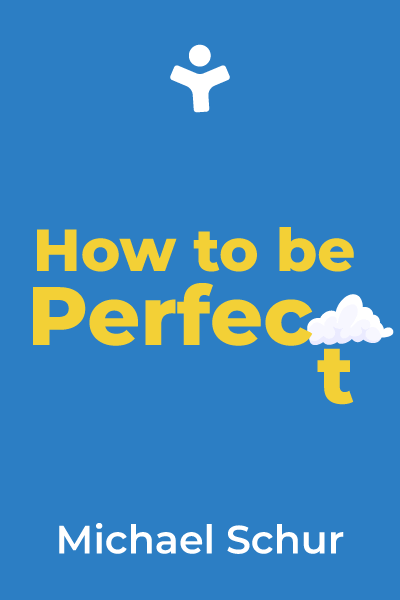
How to Be Perfect: The Correct Answer to Every Moral Question
by Michael SchurHow to Be Perfect: The Correct Answer to Every Moral Question is a humorous yet provocative reflection on morality and ethics. It is an informal guide to becoming virtuous through habituation, leading to our own personal flourishing. Full of profound insights, anecdotes, and witty remarks, this book takes you on a journey of personal growth, a re-examination of values, and practical philosophy.
Becoming Virtuous
“What a wonderful idea—that when we practice a virtue over and over and over, we become fluent in the virtue.”
We all have the potential to acquire virtues. Becoming virtuous is a painstaking and lifelong process because it requires habituation and taking action. We become good people by doing good deeds. According to Aristotle, the greatest goal in life is to flourish, which can be achieved by acquiring the right amount and scale of values.
Since being virtuous is not an inherent human trait, we can attain any virtue if we dedicate time and effort to it. We can flourish more easily when we are devoted to the habituation process.
If we want to become more generous, then we should do generous actions. The important point is that everybody should find their “golden mean,” or the middle between two extremes. For example, striving only to be generous, not too generous, or aiming to be brave, not to be too brave, and so on.
The problem with the two extremes is that being too little or too much of something does not make you a virtuous person. Being too generous means that people can exploit you in various ways. The other extreme end of being generous is being mean, selfish, and reluctant to help people even when it’s in your power to do so.
Actions to take
Doing Small Acts of Kindness
“I love those little kindnesses—the almost imperceptible improvements on the world we live in, done solely for the benefit of other people.”
The smallest gestures we make for each other can make the world a better place, even if it may seem imperceptible. Showing consideration for other people, whether they are friends, family, or strangers, binds society together.
The beauty of small gestures aimed at improving somebody’s condition is that they are free, and everyone can make them. If you can park in such a way that you leave enough parking space for someone else, do it. If a neighbor needs help carrying boxes up the stairs, lend a hand. The same logic applies to thousands of everyday situations.
A common goal for all the people living in a society should be to help others, even if you have to go the extra mile to do so.
Actions to take
Owning Up to Your Mistakes
“Whataboutism is most commonly deployed as a defensive strategy.”
Every person is responsible for their own actions. Since nobody’s perfect, we are bound to make mistakes throughout our lives. When we do something wrong, the right action is to own up to our mistakes and rectify the damage.
The problems arise when a person refuses to take responsibility for their bad actions and becomes defensive by bringing up a completely unrelated topic. More often than not, these people try to attack the credibility of others instead of admitting their mistakes. This strategy of deflecting attention to unrelated misdeeds is known as “whataboutism.”
Shame and guilt play a vital role in the moral fabric of society. Shaming a person when they’ve done something immoral or unethical is beneficial for society because the person who behaved wrongfully will pay the price for their wrongdoing and, hopefully, will reconsider their actions in the future. People who can feel shame for their bad actions still have the capacity for personal growth and improvement.
Actions to take
Making Better Choices
“Plenty of great TV shows and movies involve people making tiny bad decisions and then spending the rest of their lives making more and more of them to try to make up for the first one, eventually becoming irredeemable monsters.”
Internal feelings of guilt can serve as our own personal moral compass for the future. Even though experiencing guilt can be gut-wrenching and emotionally painful, it is a positive sign that a person can change for the better.
Making better choices on the road to becoming virtuous can be difficult and annoying, but it is necessary to ensure that we make a positive impact on the society we live in. And while we don’t want to make an effort sometimes, we should still do it because it’s the right thing to do for humanity.
Actions to take
Reassessing Traditional Values
“The most important part of becoming better people, I’ll say yet again, is that we care about whether what we do is good or bad, and therefore try to do the right thing.”
Society, culture, and norms are constantly evolving; therefore, maintaining disputable customs and beliefs simply for tradition's sake might not always be morally right. Sometimes, tradition sometimes embraces discriminatory and sexist elements and even violates some basic human rights.
If we decide to become virtuous people, we must reassess the values that have been instilled in us through various channels, such as family, society, religion, history, politics, the media, etc. Re-examining problematic, sensitive, and hot issues with a critical mind can only lead to personal growth and self-improvement.
Since the world is constantly changing, we need to adapt to new and modern times. If an ethical issue affects a group of people but does not directly affect us, we must still address and consider it, especially if it violates human rights. Being compassionate is a virtue, but even then, we must still stay away from its extreme ends. It’s important to find the golden mean in everything.
Actions to take
Don’t just read. Act.

